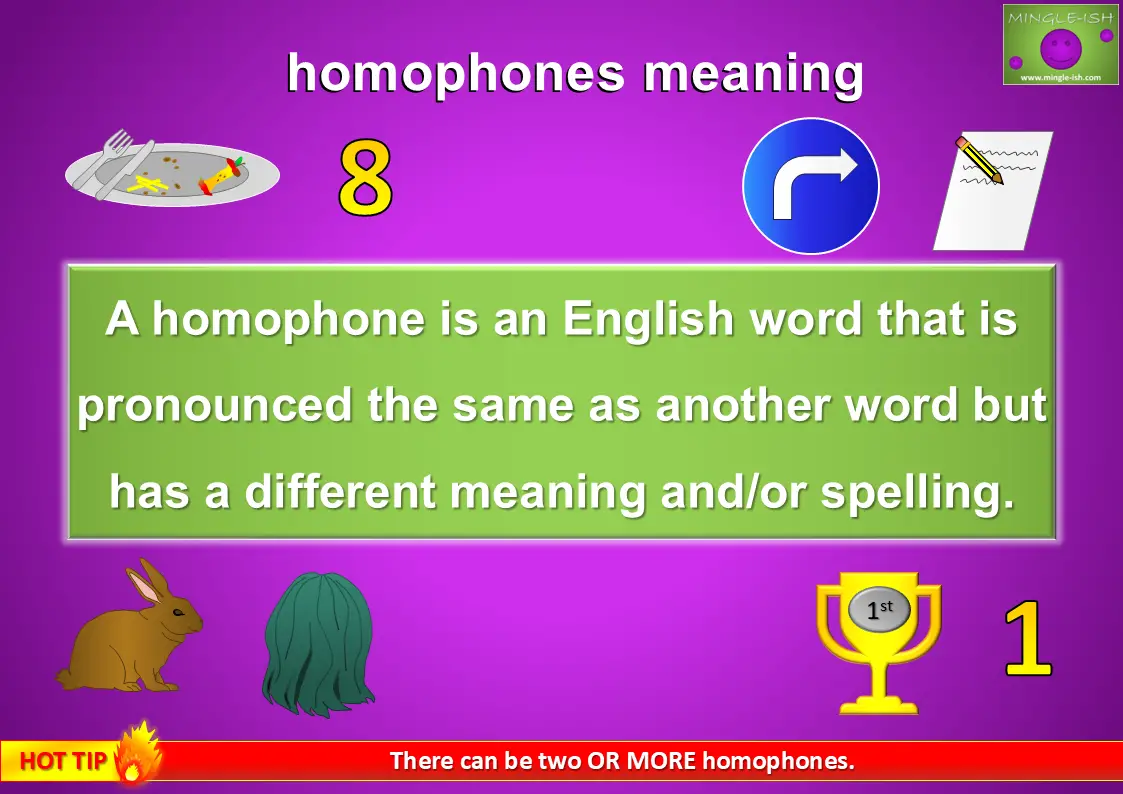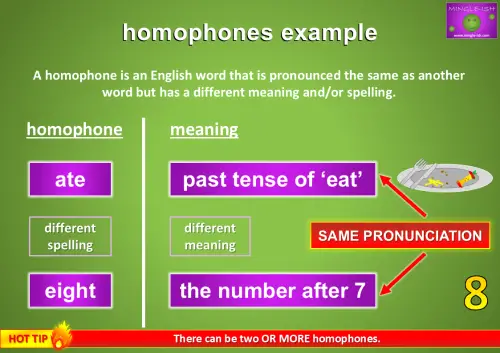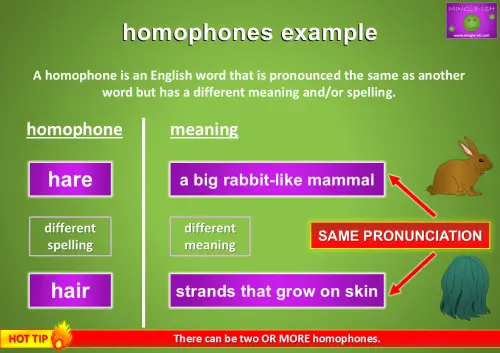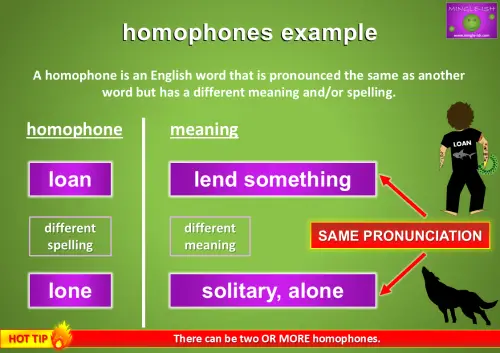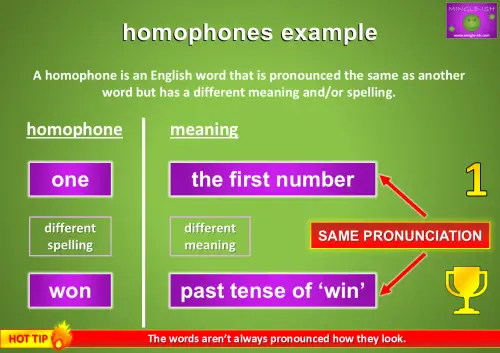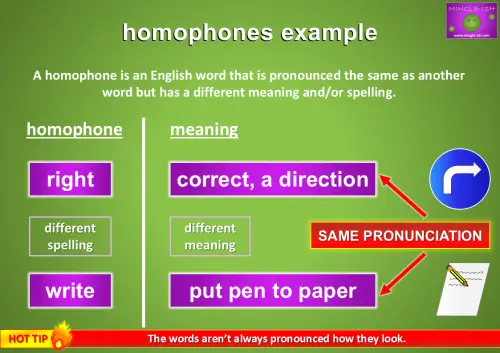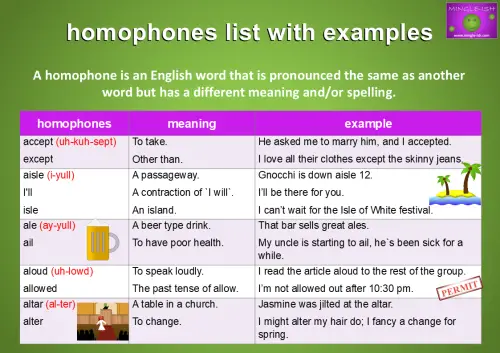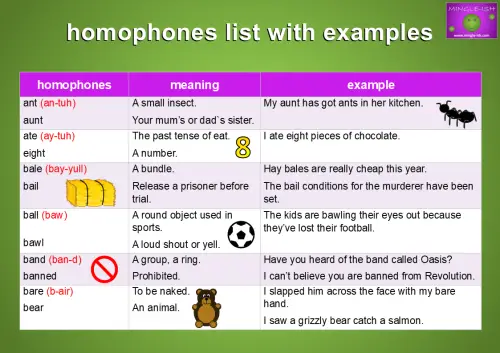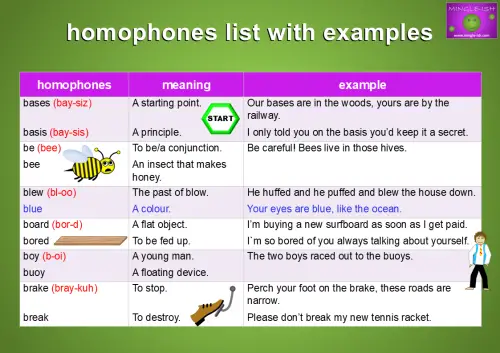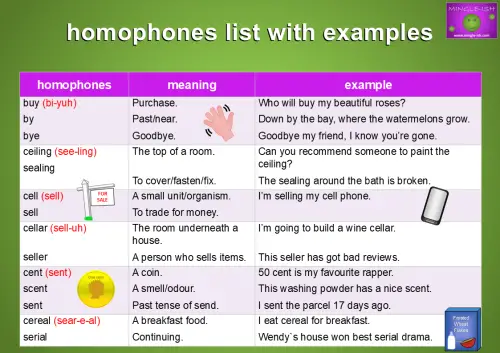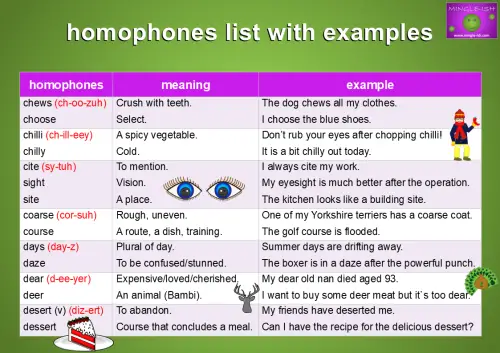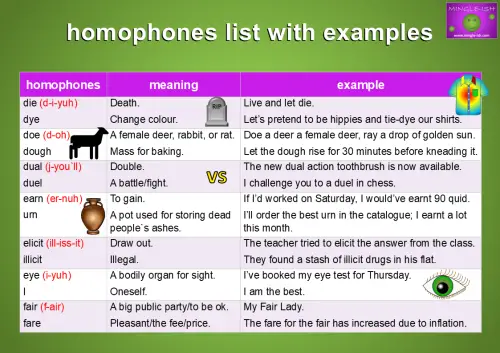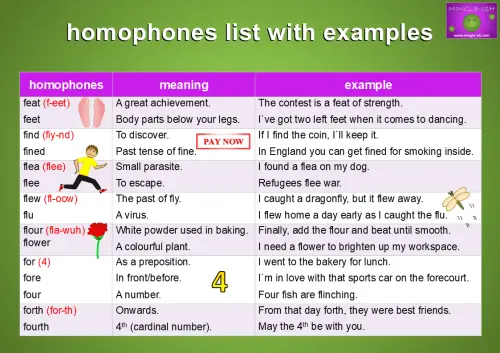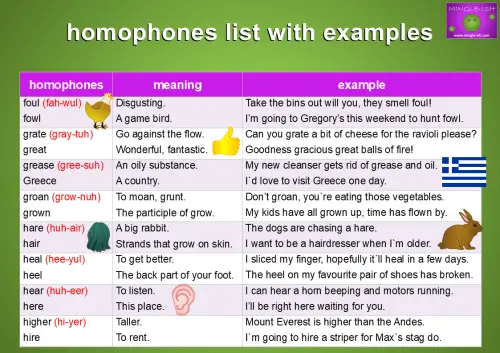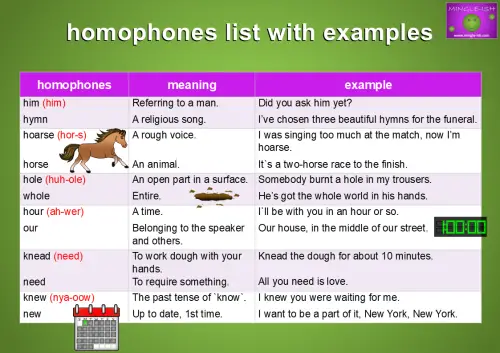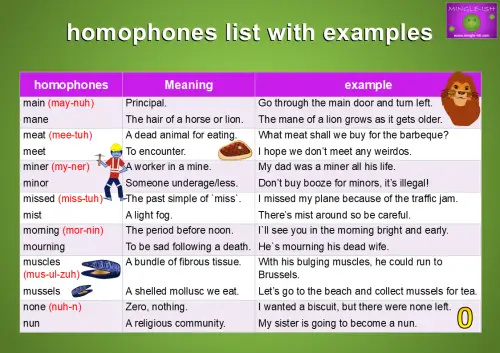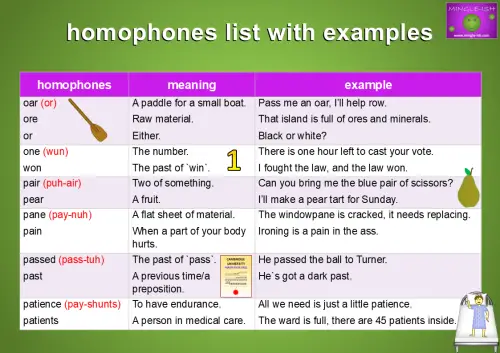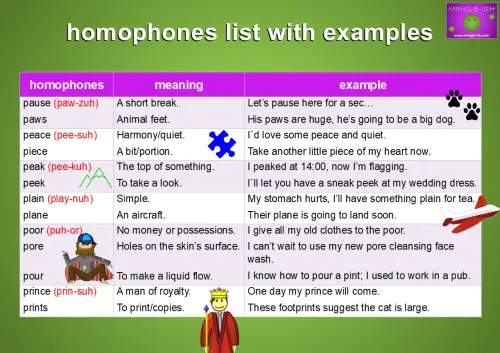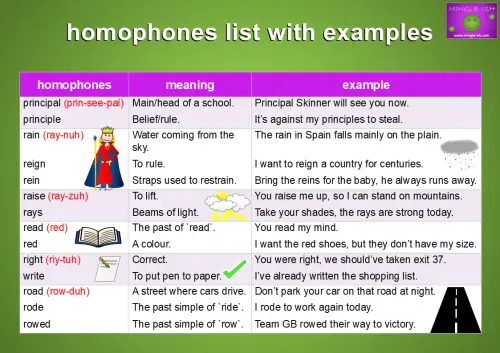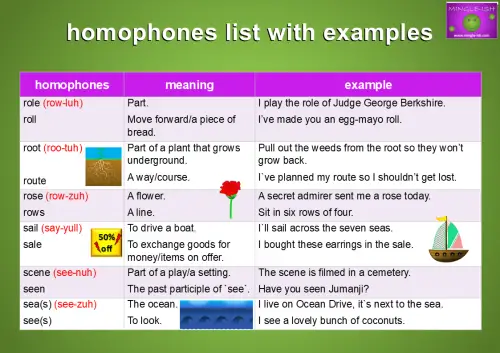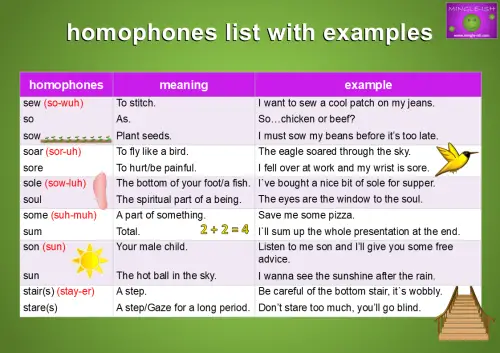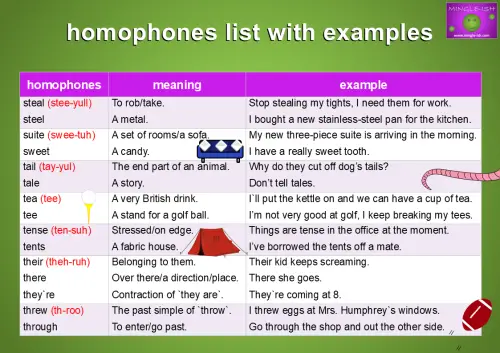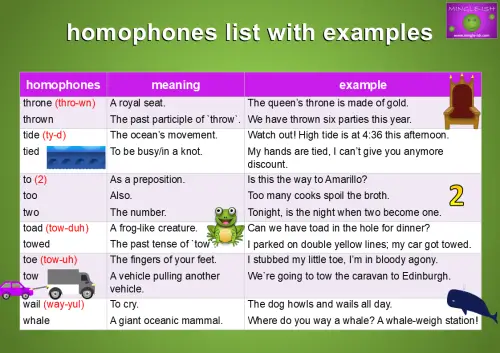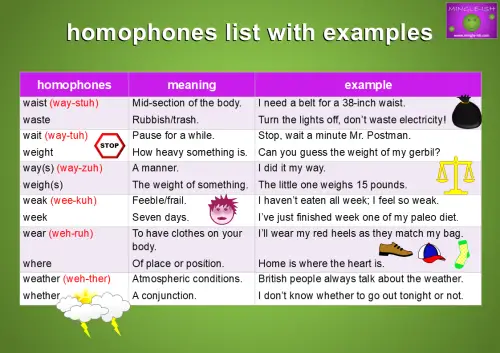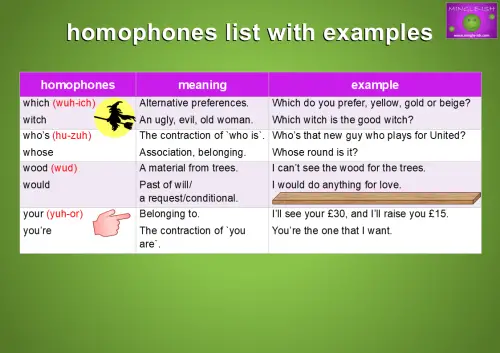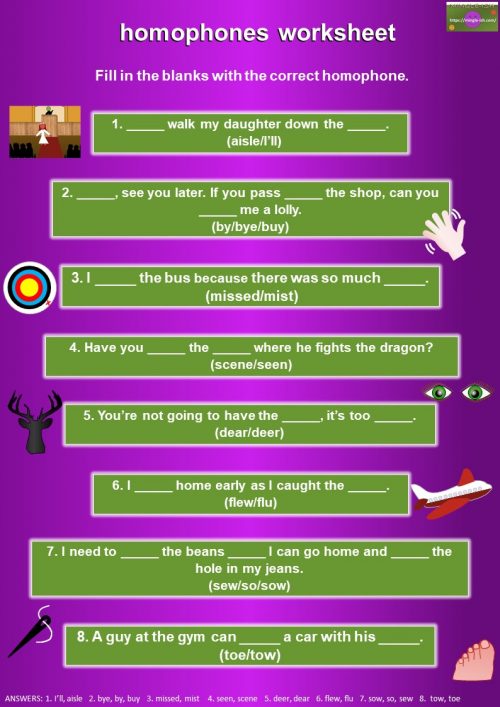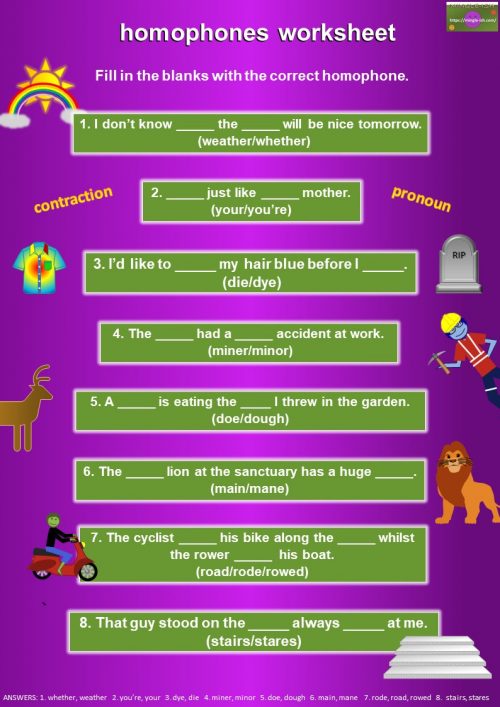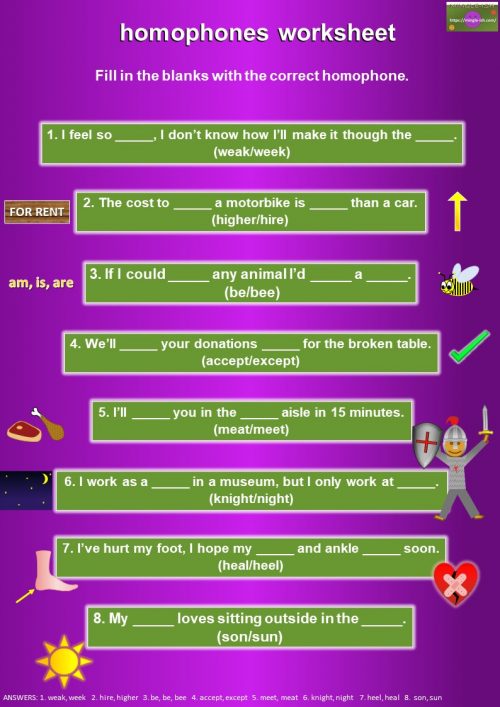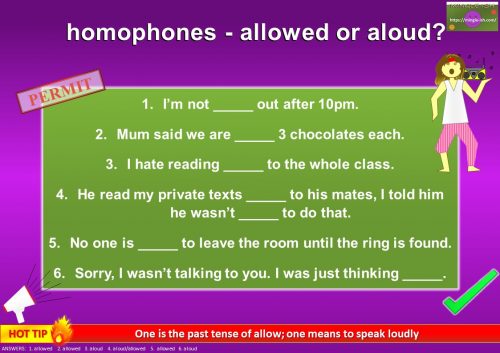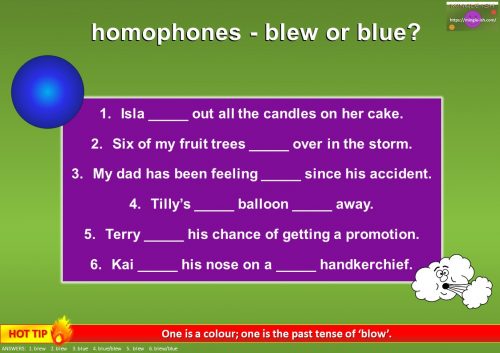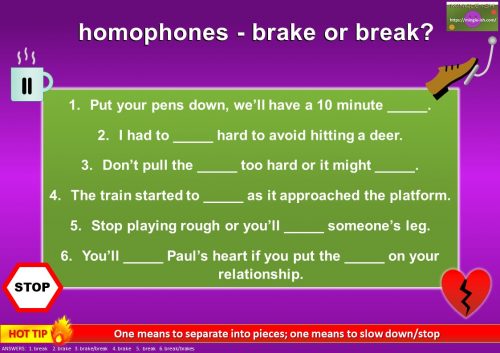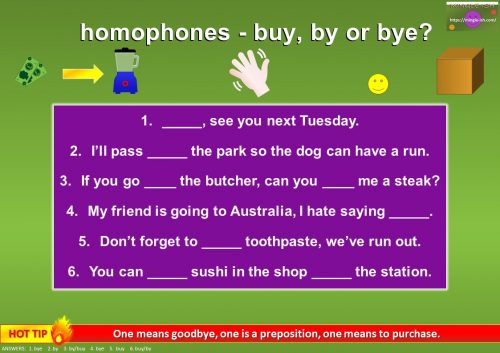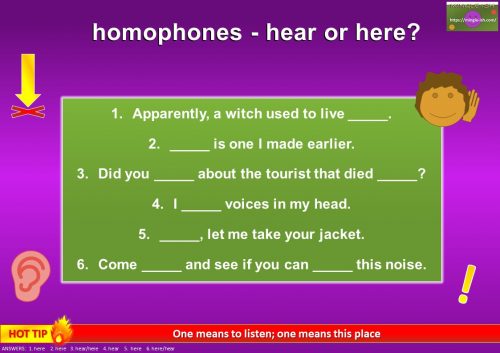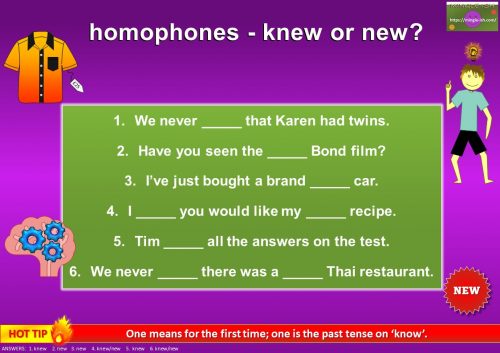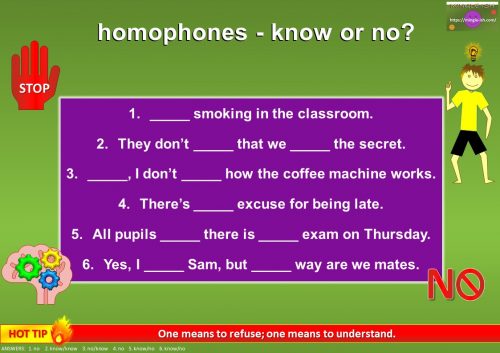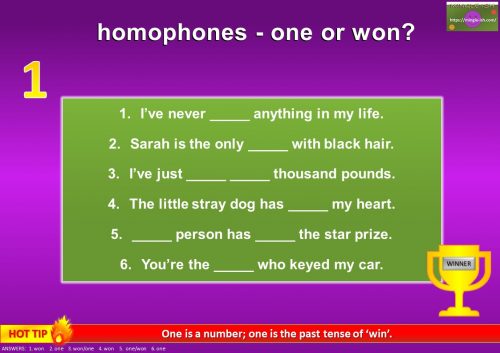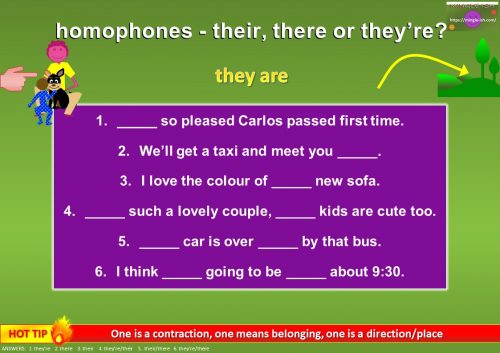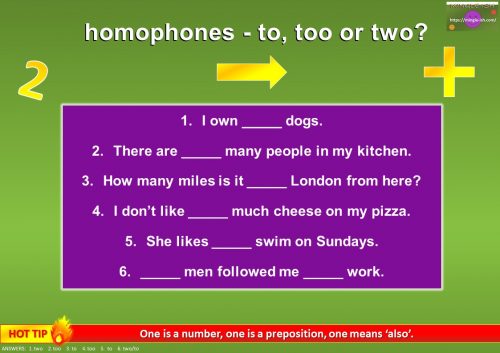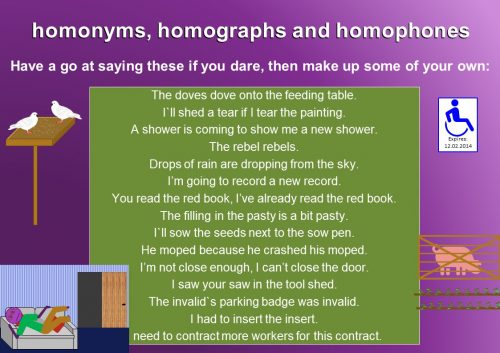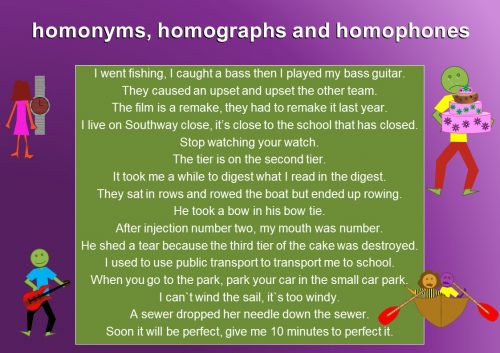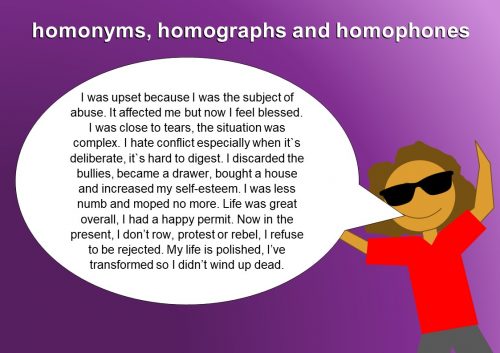Contents
Homophones are fascinating aspects of the English language that often confuse learners and native speakers alike. These are words that sound the same but have different meanings, spellings, or both. For example, “flower” and “flour” may sound identical, but they refer to very different things. Mastering homophones can sharpen your vocabulary skills and help you avoid common mistakes in writing and speech. Explore over 120 homophones with examples to enhance your understanding and fluency.
Let’s dive in!
homophones meaning
Homophones are words in English that sound the same but are spelt different. These words also have a different meaning.
Confused? Let me give you some examples then you can read the full list.
- One – a number – pronounced ‘wun’
- Won – past tense of ‘win’ – pronounced ‘wun’
- Buy – to purchase something – pronounced ‘bi’
- By – past/near – pronounced ‘bi’
- Bye – short for ‘goodbye’ – pronounced ‘bi’
As you can see, the two (or three) words are pronounced the same. However, they have a different meaning and different spelling. That my friends, is what we call a ‘homophone‘ in English.
homophones examples
Here are a few common homophone examples, along with pictures, to help you get familiar with words that sound alike but have different meanings.
I think you get the idea from the examples above. For those of you who really want to nail your pronunciation; homographs, homonyms and homophones are for you!
homophones list with examples
Homonyms are very tricky for non-natives to learn and distinguish between. Have a crack at learning some of the most common ones. I’ve given you the two (or more) homophones, the meaning and some tips for pronunciation.
Here’s a few but there are lots more. Good luck!
accept, except
- accept (to take)
example – He asked me to marry him, and I accepted. - except (other than)
example – I love all their clothes except the skinny jeans.
aisle, I’ll, isle
- aisle (a passageway)
example – Gnocchi is down aisle 12. - I’ll (a contraction of `I will`)
example – I’ll be there for you. - isle (an island)
example – I can’t wait for the Isle of White festival.
ale, ail
- ale (a beer type drink)
example – That bar sells great ales. - ail (to have poor health)
example – My uncle is starting to ail, he`s been sick for a while.
aloud, allowed
- aloud (to speak loudly)
example – I read the article aloud to the rest of the group. - allowed (the past tense of allow)
example – I’m not allowed out after 10:30 pm.
altar, alter
- altar (a table in a church)
example – Jasmine was jilted at the altar. - alter (to change)
example – I might alter my hair do; I fancy a change for spring.
ant, aunt
- ant (a small insect)
example – There is an ant nest in our garden. - aunt (your mum’s or dad`s sister)
example – My aunt has got ants in her kitchen.
ate, eight
- ate (the past tense of eat)
example – I ate far too much at lunch. - eight (a number)
example – I ate eight pieces of chocolate.
bail, bale
- bail (release a prisoner before trial)
example – The bail conditions for the murderer have been set. - bale (a bundle)
example – Hay bales are really cheap this year.
ball, bawl
- ball (a round object used in sports)
example – The dog punctured our ball. - bawl (a loud shout or yell)
example – The kids are bawling their eyes out because they’ve lost their football.
band, banned
- band (a group, a ring)
example – Have you heard of the band called Oasis? - banned (prohibited)
example – I can’t believe you are banned from Revolution.
bare, bear
- bare (to be naked)
example – I slapped him across the face with my bare hand. - bear (an animal)
example – I saw a grizzly bear catch a salmon.
bases, basis
- bases (a starting point)
example – Our bases are in the woods, yours are by the railway. - basis (a principle)
example – I only told you on the basis you’d keep it a secret.
be, bee
- be (to be/a conjunction)
example – The children need to be quiet before we start the film. - bee (an insect that makes honey)
example – Be careful! Bees live in hives.
blew, blue
- blew (the past of blow)
example – He huffed and he puffed and blew the house down. - blue (a colour)
example – Your eyes are blue, like the ocean.
board, bored
- board (a flat object)
example – I’m buying a new surfboard as soon as I get paid. - bored (to be fed up)
example – I`m so bored of you always talking about yourself.
boy, buoy
- boy (a young man)
example – I went into the Army a boy and came out a man. - buoy (a floating device)
example – The two boys raced out to the buoys.
brake, break
- brake (to stop)
example – Perch your foot on the brake, these roads are narrow. - break (to destroy)
example – Please don’t break my new tennis racket.
buy, by, bye
- buy (purchase)
example – Who will buy my beautiful roses? - by (past/near)
example – Down by the bay, where the watermelons grow. - bye (goodbye)
example – Goodbye my friend, I know you’re gone.
ceiling, sealing
- ceiling (Can you recommend someone to paint the ceiling?)
example – Who will buy my beautiful roses? - sealing (to cover/fasten/fix)
example – The sealing around the bath is broken.
cell, sell
- cell (a small unit/organism)
example – You’re going to be locked in a prison cell for the rest of your days. - sell (to trade for money)
example – I’m selling my cell phone.
cellar, seller
- cellar (the room underneath a house)
example – I’m going to install a wine cellar. - seller (a person who sells items)
example – This seller has got bad reviews.
cent, scent, sent
- cent (a coin)
example – 50 cent is my favourite rapper. - scent (a smell/odour)
example – This washing powder has a nice scent. - sent (past tense of send)
example – I sent the parcel 17 days ago.
cereal, serial
- cereal (a breakfast food)
example – I eat cereal for breakfast. - serial (continuing)
example – Wendy`s house won best serial drama.
chews, choose
- chews (crush with teeth)
example – The dog chews all my clothes. - choose (select)
example – I choose the blue shoes.
chilli, chilly
- chilli (a spicy vegetable)
example – Don’t rub your eyes after chopping chilli! - chilly (cold)
example – It is a bit chilly out today.
cite, sight, site
- cite (to mention)
example – I always cite my work. - sight (vision)
example – My eyesight is much better after the operation. - site (a place)
example – The kitchen looks like a building site.
coarse, course
- coarse (rough, uneven)
example – One of my Yorkshire terriers has a coarse coat. - course (a route, a dish, training)
example – The golf course is flooded.
days, daze
- days (plural of day)
example – Summer days are drifting away. - daze (to be confused/stunned)
example – The boxer is in a daze after the powerful punch.
dear, deer
- dear (expensive/loved/cherished)
example – My dear old nan died aged 93. - deer (an animal (Bambi))
example – I want to buy some deer meat but it`s too dear.
desert, dessert
- desert (to abandon)
example – My friends have deserted me. - dessert (course that concludes a meal)
example – Can I have the recipe for the delicious dessert?
die, dye
- die (death)
example – Live and let die. - dye (change colour)
example – Let’s pretend to be hippies and tie-dye our shirts.
doe, dough
- doe (a female deer, rabbit, or rat)
example – Doe a deer a female deer, ray a drop of golden sun. - dough (masa for baking)
example – Let the dough rise for 30 minutes before kneading it.
dual, duel
- dual (double)
example – The new dual action toothbrush is now available. - duel (a battle/fight)
example – I challenge you to a duel in chess.
earn, urn
- earn (to gain)
example – If I work on Saturday, I’ll earn 90 quid. - urn (a pot used for storing dead people`s ashes)
example – I’ll order the best urn in the catalogue; I earnt a lot this month.
elicit, illicit
- elicit (draw out)
example – The teacher tried to elicit the answer from the class. - illicit (illegal)
example – They found a stash of illicit drugs in his flat.
eye, I
- eye (a bodily organ for sight)
example – I’ve booked my eye test for Thursday. - I (oneself)
example – I am the best.
fair, fare
- fair (a big public party/to be ok)
example – My Fair Lady. - fare (pleasant/the fee/price)
example – The fare for the fair has increased due to inflation.
feat, feet
- feat (great achievement)
example – The contest is a feat of strength. - feet (body parts below your legs)
example – I`ve got two left feet when it comes to dancing.
find, fined
- find (to discover)
example – If I find the coin, I`ll keep it. - fined (past tense of fine)
example – In England you can get fined for smoking inside.
flea, flee
- flea (small parasite)
example – I found a flea on my dog. - flee (to escape)
example – Refugees flee war.
flew, flu
- flew (the past of fly)
example – I caught a dragonfly, but it flew away. - flu (a virus)
example – I flew home a day early as I caught the flu.
flour, flower
- flour (white powder used in baking)
example – Finally, add the flour and beat until smooth. - flower (a colourful plant)
example – I need a flower to brighten up my workspace.
for, fore, four
- for (as a preposition)
example – I went to the bakery for lunch. - fore (in front/before)
example – I`m in love with that sports car on the forecourt. - four (a number)
example – Four fish are flinching.
forth, fourth
- forth (onwards)
example – From that day forth, they were best friends. - fourth (4th [cardinal number])
example – May the 4th be with you.
foul, fowl
- foul (disgusting)
example – Take the bins out will you, they smell foul! - fowl (a game bird)
example – I’m going to Gregory’s this weekend to hunt fowl.
grate, great
- grate (go against the flow)
example – Can you grate a bit of cheese for the ravioli please? - great (wonderful, fantastic)
example – Goodness gracious great balls of fire!
grease, Greece
- grease (an oily substance)
example – My new cleanser gets rid of grease and oil. - Greece (a country)
example – I`d love to visit Greece one day.
groan, grown
- groan (to moan, grunt)
example – Don’t groan, you`re eating those vegetables. - grown (the participle of grow)
example – My kids have all grown up, time has flown by.
hare, hair
- hare (a big rabbit)
example – The dogs are chasing a hare. - hair (strands that grow on skin)
example – I want to be a hairdresser when I`m older.
heal, heel
- heal (to get better)
example – I sliced my finger, hopefully it`ll heal in a few days. - heel (the back part of your foot)
example – The heel on my favourite pair of shoes has broken.
hear, here
- hear (to listen)
example – I can hear a horn beeping and motors running. - here (this place)
example – I’ll be right here waiting for you.
higher, hire
- higher (taller)
example – Mount Everest is higher than the Andes. - hire (to rent)
example – I`m going to hire a striper for Max`s stag do.
him, hymn
- him (referring to a man)
example – Did you ask him yet? - hymn (a religious song)
example – I’ve chosen three beautiful hymns for the funeral.
hoarse, horse
- hoarse (a rough voice)
example – I was singing too much at the match, now I’m hoarse. - horse (an animal)
example – It`s a two-horse race to the finish.
hole, whole
- hole (an open part in a surface)
example – Somebody burnt a hole in my trousers. - whole (entire)
example – He’s got the whole world in his hands.
hour, our
- hour (a time)
example – I`ll be with you in an hour or so. - our (belonging to the speaker and others)
example – Our house, in the middle of our street.
knead, need
- knead (to work dough with your hands)
example – Knead the dough for about 10 minutes. - need (to require something)
example – All you need is love.
knew, new
- knew (the past tense of `know`)
example – I knew you were waiting for me. - new (up to date, 1st time)
example – I want to be a part of it New York, New York.
knight, night
- knight (a warrior dressed in armour)
example – King Arthur had lots of knights. - night (the dark period after the day)
example – Tonight’s the night.
knot, not
- knot (to tie)
example – Tie a knot in your shoelaces before you trip over. - not (no/never)
example – That`s not a good idea.
know, no
- know (to understand)
example – How will I know if he really loves me? - no (refuse)
example – No talking in the library.
knows, nose
- knows (third person of `know`)
example – She knows more that she`s letting on. - nose (the organ you breathe through)
example – Everyone knows that her nose is fake.
lead, led
- lead (a poisonous metal)
example – Lead based paints are now banned. - led (the past simple of `lead`)
example – The king led the troops into battle.
made, maid
- made (the past simple of `make`)
example – I`m not made of money. - maid (a young woman servant)
example – Maid Marion and her merry men.
mail, male
- mail (to send)
example – I’ll mail you the figures shortly. - male (masculine)
example – This toilet is for males only.
main, mane
- main (principal)
example – Go through the main door and turn left. - mane (the hair of a horse of lion)
example – The mane of a lion grows as it gets older.
meat, meet
- meat (a dead animal for eating)
example – What meat shall we buy for the barbeque? - meet (to encounter)
example – I hope we don’t meet any weirdos.
miner, minor
- miner (a worker in a mine)
example – My dad was a miner all his life. - minor (someone underage/less)
example – Don’t buy booze for minors, it’s illegal!
missed, mist
- missed (the past simple of `miss`)
example – I missed my plane because of the traffic jam. - mist (a light fog)
example – There’s mist around so be careful.
morning, mourning
- morning (the period before noon)
example – I`ll see you in the morning bright and early. - mourning (to be sad following a death)
example – He`s mourning his dead wife.
muscles, mussels
- muscles (a bundle of fibrous tissue)
example – With his bulging muscles, he could run to Brussels. - mussels (a shelled mollusc we eat)
example – Let’s go to the beach and collect mussels for tea.
none, nun
- none (zero, nothing)
example – I wanted a biscuit, but there were none left. - nun ( a religious community)
example – My sister is going to become a nun.
oar, ore, or
- oar (paddle for a small boat)
example – Pass me an oar, I’ll help row. - ore (raw material)
example – That island is full of ores and minerals. - or (either)
example – Black or white?
one, won
- one (the number)
example – There is one hour left to cast your vote. - won (the past of `win`)
example – I fought the law and the law won.
pair, pear
- pair (two of something)
example – Can you bring me the blue pair of scissors? - pear (a fruit)
example – I’ll make a pear tart for Sunday.
pane, pain
- pane (a flat sheet of material)
example – The windowpane is cracked, it needs replacing. - pain (when a part of your body hurts)
example – Ironing is a pain in the bum.
passed, past
- passed (the past of `pass`)
example – He passed the ball to Turner. - past (a previous time/a preposition)
example – He`s got a dark past.
patience, patients
- patience (to have endurance)
example – All we need is just a little patience. - patients (a person in medical care)
example – The ward is full, there are 45 patients inside.
pause, paws
- pause (a short break)
example – Let’s pause here for a sec… - paws (animal feet)
example – His paws are huge, he’s going to be a big dog.
peace, piece
- peace (harmony/quiet)
example – I`d love some peace and quiet. - piece (a bit/portion)
example – Take another little piece of my heart now.
peak, peek
- peak (the top of something)
example – I peaked at 14:00, now I’m flagging. - peek (to take a look)
example – I`ll let you have a sneak peek at my wedding dress.
plain, plane
- plain (simple)
example – My stomach hurts, I’ll have something plain for tea. - plane (an aircraft)
example – Their plane is going to land soon.
poor, pore, pour
- poor (no money or possessions)
example – I give all my old clothes to the poor. - pore (holes on your skin’s surface)
example – I can’t wait to use my new pore cleansing face wash. - pour (to make a liquid flow)
example – I know how to pour a pint, I used to work in a pub.
prince, prints
- prince (a man of royalty)
example – One day my prince will come. - prints (to print/copies)
example – These footprints suggest the cat is large.
principal, principle
- principal (main/head of a school)
example – Principal Skinner will see you now. - principle (belief/rule)
example – It’s against my principles to steal.
rain, reign, rein
- rain (water coming from the sky)
example – The rain in Spain falls mainly on the plain. - reign (to rule)
example – I want to reign a country for centuries. - rein (straps used to restrain)
example – Bring the reins for the toddler, he always runs away.
raise, rays
- raise (to life)
example – You raise me up, so I can stand on mountains. - rays (beams of light)
example – Take your shades, the rays are strong today.
read, red
- read (the past of `read`)
example – You read my mind. - red (a colour)
example – I wanted the red shoes, but they didn’t have my size.
right, write
- right (correct)
example – You were right, we should’ve taken exit 37. - write (to put pen to paper)
example – I’ve already written the shopping list.
road, rode, rowed
- road (a street where the cars drive)
example – Don’t park your car on that road at night. - rode (the past simple of `ride`)
example – I rode to work again today. - rowed (the past simple of `row`)
example – Team GB rowed their way to victory.
role, roll
- role (a part)
example – I play the role of Judge George Berkshire. - roll (move forward/a piece of bread)
example – I’ve made you an egg-mayo roll.
root, route
- root (part of a plant that grows underground)
example – Pull out the weeds from the root so they won’t grow back. - route (a way/course)
example – I`ve carefully planned my route so I shouldn’t get lost.
rose, rows
- rose (a flower)
example – A secret admirer sent me a rose today. - rows (a line)
example – Sit in six rows of four.
sail, sale
- sail (to drive a boat)
example – I`ll sail across the seven seas. - sale (to exchange goods for. money/items on offer)
example – I bought these earrings in the sale.
scene, seen
- scene (part of a play/a setting)
example – The scene is filmed in a cemetery. - seen (the past participle of `see`)
example – Have you seen Jumanji?
sea(s), see(s)
- sea(s) (the ocean)
example – I live on Ocean Drive, it`s next to the sea - see(s) (to look)
example – I see a lovely bunch of coconuts.
sew, so, sow
- sew (to stitch)
example – I want to sew a cool patch on my jeans. - so (as)
example – So…chicken or beef? - sow (plant seeds)
example – I must sow my beans before it’s too late.
soar, sore
- soar (to fly like a bird)
example – The eagle soared through the sky. - sore (to hurt/be painful)
example – I fell over at work and my wrist is sore.
sole, soul
- sole (the bottom of your foot/a fish)
example – I`ve bought a nice bit of sole for supper. - soul (the spiritual part of a being)
example – The eyes are the window to the soul.
some, sum
- some (a part of something)
example – Save me some pizza. - sum (total)
example – I`ll sum up the whole presentation at the end.
son, sun
- son (your male child)
example – Listen to me son and I’ll give you some free advice. - sun (the hot ball in the sky)
example – I want to see the sunshine after the rain.
stair(s), stare(s)
- stair(s) (a step)
example – Be careful of the bottom stair, it`s wobbly. - stare(s) (a step/gaze for a long period)
example – Don’t stare too much, you’ll go blind.
steal, steel
- steal (to rob/take)
example – Stop stealing my tights, I need them for work. - steel (a metal)
example – I bought a new stainless-steel pan for the kitchen.
suite, sweet
- suite (a set of rooms/a sofa)
example – My new three-piece suite is arriving in the morning. - sweet (a candy)
example – I have a really sweet tooth.
tail, tale
- tail (the end part of an animal)
example – Why do they cut off dog’s tails? - tale (a story)
example – Don’t tell tales.
tea, tee
- tea (a very British drink)
example – I`ll put the kettle on and we can have a cup of tea. - tee (a stand for a golf ball)
example – I’m not very good at golf, I keep breaking all my tees.
tense, tents
- tense (stressed/on edge)
example – Things are tense in the office at the moment. - tents (a fabric house)
example – I’ve borrowed the tents off a mate.
their, there, they’re
- their (belonging to them)
example – Their kid keeps screaming. - there (over there/a direction/place)
example – There she goes. - they’re (contraction of `they are)
example – They`re coming at 8.
threw, through
- threw (the past simple of `throw`)
example – I threw eggs at Mrs. Humphrey`s windows. - through (to enter/go past)
example – Go through the shop and out the other side.
throne, thrown
- throne (a royal seat)
example – The queen’s throne is made of gold. - thrown (the past participle of `throw`)
example – We have thrown six parties this year.
tide, tied
- tide (the ocean’s movement)
example – Watch out! High tide is at 4:36 this afternoon. - tied (to be busy/in a knot)
example – My hands are tied, I can’t give you anymore discount.
to, too, two
- to (as a preposition)
example – Is this the way to Amarillo? - too (also)
example – Too many cooks spoil the broth. - two (the number)
example – Tonight, is the night when two become one.
toad, towed
- toad (a frog like creature)
example – Can we have toad in the hole for dinner? - towed (the past tense of `tow`)
example – I parked on double yellow lines; my car got towed.
toe, tow
- toe (the fingers of your feet)
example – I stubbed my little toe, I’m in bloody agony. - tow (a vehicle pulling another vehicle)
example – We`re going to tow the caravan to Edinburgh.
wail, whale
- wail (to cry)
example – The dog howls and wails all day. - whale (a giant oceanic mammal)
example – Where do you way a whale? A whale-weigh station!
waist, waste
- waist (mid-section of the body)
example – I need a belt for a 38-inch waist. - waste (rubbish/trash)
example – Turn the lights off, don’t waste electricity!
wait, weight
- wait (pause for a while)
example – Stop, wait a minute Mr. Postman. - weight (how heavy something is)
example – Can you guess the weight of my gerbil?
way(s), weigh(s)
- way(s) (a manner)
example – I did it my way. - weigh(s) (the weight of something)
example – The little one weighs 15 pounds.
weak, week
- weak (feeble/frail)
example – I haven’t eaten all week; I feel so weak. - week (seven days)
example – I’ve just finished week one of my paleo diet.
wear, where
- wear (to have clothes on your body)
example -I’ll wear my red heels as they match my bag. - where (of place or position)
example – Home is where the heart is.
weather, whether
- weather (atmospheric conditions)
example – British people always talk about the weather. - whether (a conjunction)
example – I don’t know whether to go out tonight or not.
which, witch
- which (alternative preferences)
example – Which do you prefer, yellow, gold or beige? - witch (an ugly, evil, old woman)
example – Which witch is the good witch?
who’s, whose
- who’s (the contraction of `who is`)
example – Who’s that new guy who plays for United? - whose (association, belonging)
example – Whose round is it?
wood, would
- wood (a material from trees)
example – I can’t see the wood for the trees. - would (past of will/a request/conditional)
example – I would do anything for love.
your, you’re
- your (belonging to)
example – I’ll see your £30, and I’ll raise you £15. - you’re (the contraction of `you are`)
example – You’re the one that I want.
homophones worksheets
So, you’ve learnt the list and are now a homophone pro. Have a go at completing these exercises, the answers are at the bottom.
For the first exercises, fill in the blanks with the correct homophone.
For this next set of exercises, fill in the blanks using the correct homophone from the title. There’s a few video quizzes you can watch if you prefer.
homophones activity
Now it’s time to practice what you’ve learnt. See if you can read these sentences with the correct pronunciation and word stress. Go on, I believe in you.
